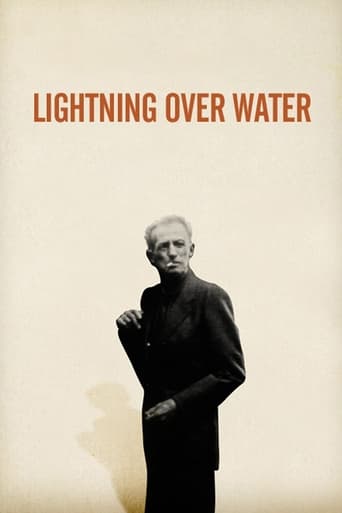Brigid O Sullivan (wisewebwoman)
Neither of the two protagonists in this pseudo documentary were served well here - Wem Wender and Nicholas Ray but shame particularly on Wender who was filming the last few months of Ray's life.Surely there was more to Mr. Ray than what was portrayed here? Could he not have had him commenting more on his vast body of work, his marriages, his children?It all felt highly exploitive and downright contrived but perhaps Mr. Ray had put restraints on Mr. Wender's access to his thoughts and feelings.But all I'm taking away from this is the nightmarish chain-smoking of Mr. Ray (everywhere, hospitals, Vassar, cabs - yeah it was 1979!) and the endless, hacking, breath-gulping, rasping sounds of his coughing from lung cancer.1 out of 10. To see a wonderful documentary on death and dying watch "Dying at Grace".
Klaus Ming
Lightning Over Water began as a collaborative idea to tell the story of a dying painter who steals art from museums and replaces them with his own forgeries. Suffering from terminal cancer himself, Ray's health quickly deteriorates during the project. The film eventually ceases to be a work of fiction and becomes a documentary of Ray's finals days in which he fittingly spends making film. In reflecting over his career and life, Ray ponders his successes and failures as a film maker who is best known for Rebel Without a Cause (1955). A poignant and often disturbing film, Lighting Over Water is ultimately a painful homage to a film maker and to a friend (Klaus Ming March 2013).
mboedicker-1
Two video versions of this film exist, both roughly the same length. The first was released by Pacific Video on VHS in 1987, the second just this month (1/03) by Anchor Bay on DVD. According to Kathe Geist's book "The Cinema of Wim Wenders: From Paris France to Paris Texas," Wenders was so depressed by the filming of "Lightning" and Ray's death that he handed the footage over to his editor, Peter Przygodda, who spent a year fashioning it into a version shown at Cannes; apparently this is also the version released by Pacific Video in 1987 and which I first saw around that time (and have watched many times since). Wenders supposedly found this version obscure and depressing and re-edited, adding a voiceover (his own) and superimposing passages from Ray's diary; this is the version just released on DVD, and is considered by some the definitive edition. But I find Wender's criticism of the initial cut confusing, for it's the LATTER cut (his own) which is murky and depressing. Nick Ray's final scene, for example ("Cut...Don't Cut.") is tortuous (we're watching a man dying), and there are sequences edited so bizarrely as to be almost incomprehensible. The first cut, in contrast, has a narrative flow and progression that make it easier to absorb, though it's still tough going as we witness Nick Ray's suffering. Also, Wender's narration in the 2nd version (absent in the initial cut) actually adds little to the film. The first version is unfortunately out of print but is worth tracking down because it's the superior one.
Eyeblood
this is a film i forced myself to watch in order to complete a speech in german about wim wender's amerkiabild. it is all about the death of a cancer ridden man. that is about all of the plot i could figure out.the images, as is usual with wender's films, are striking and pungent to the hollywood-movie-goer senses. the scenes in this movie are about the slowest i have ever seen. i did find a few rewarding scenes here and there scattered throughout the chaos. the graduate monkey, the speech at vassar college, and the alarm clock scene to mention a few.that is about all i know on this one.i give it two riders of the apocalypse.

